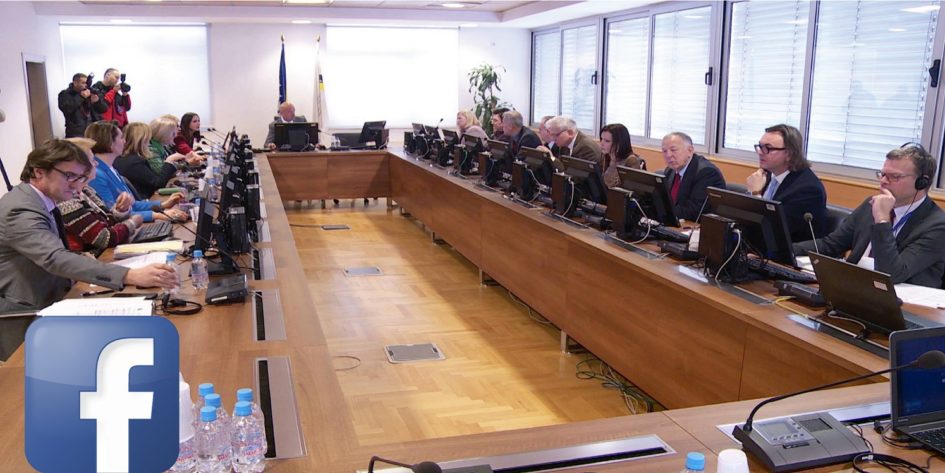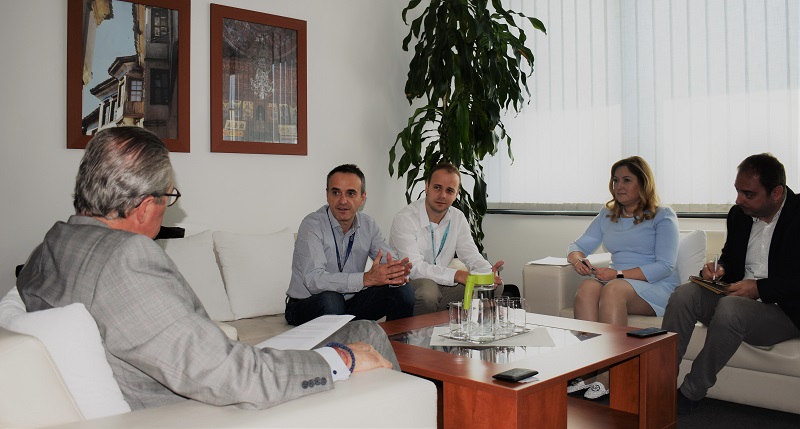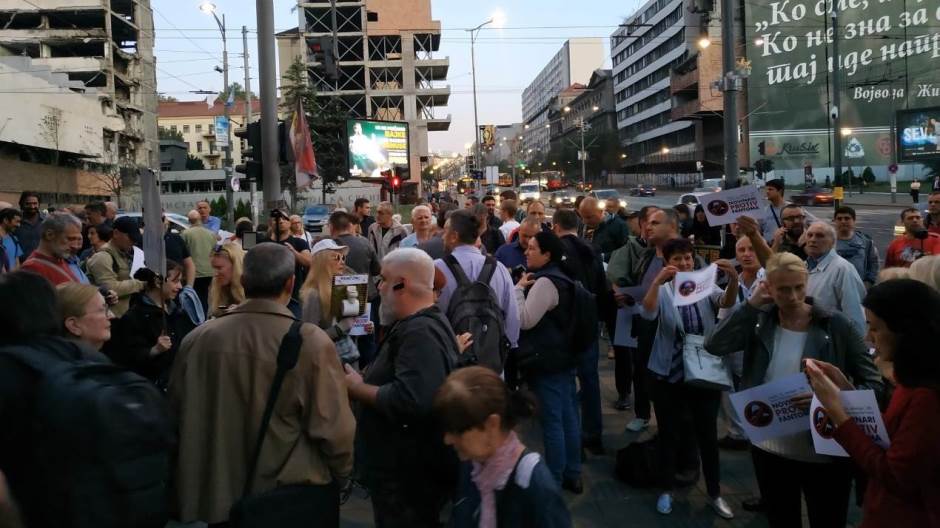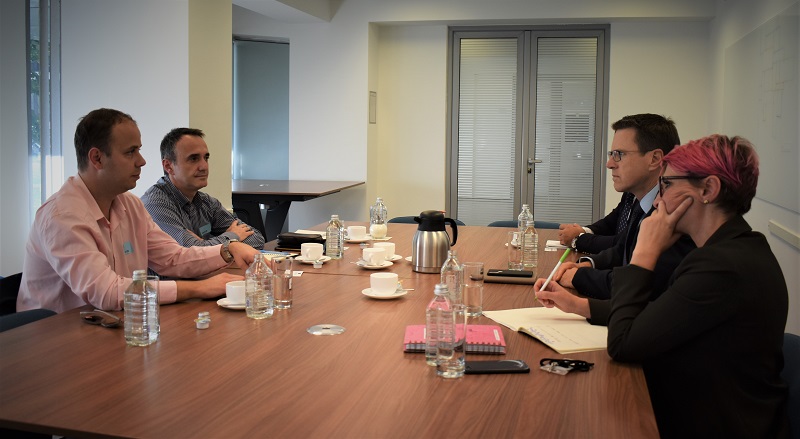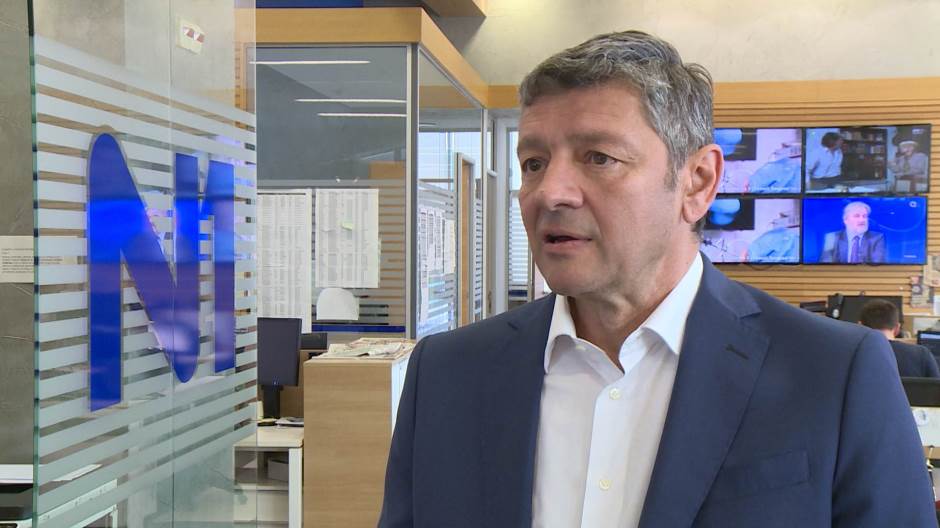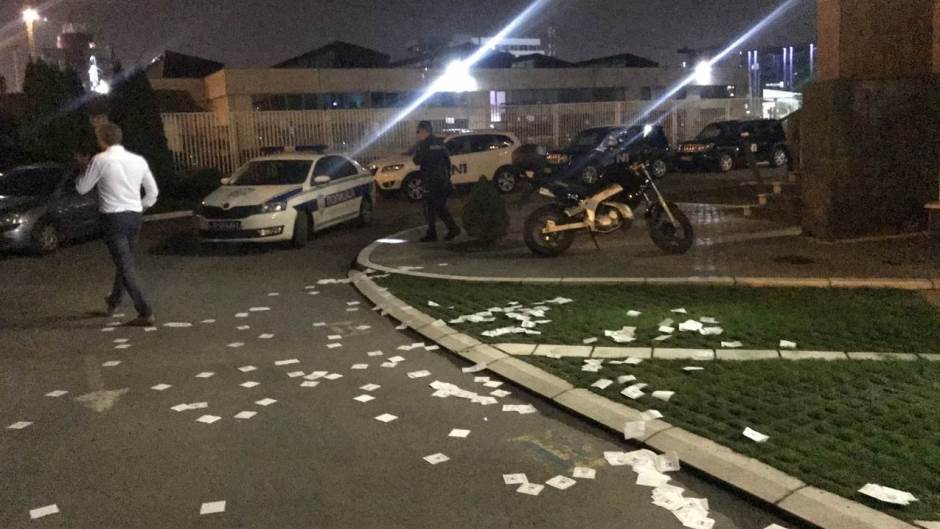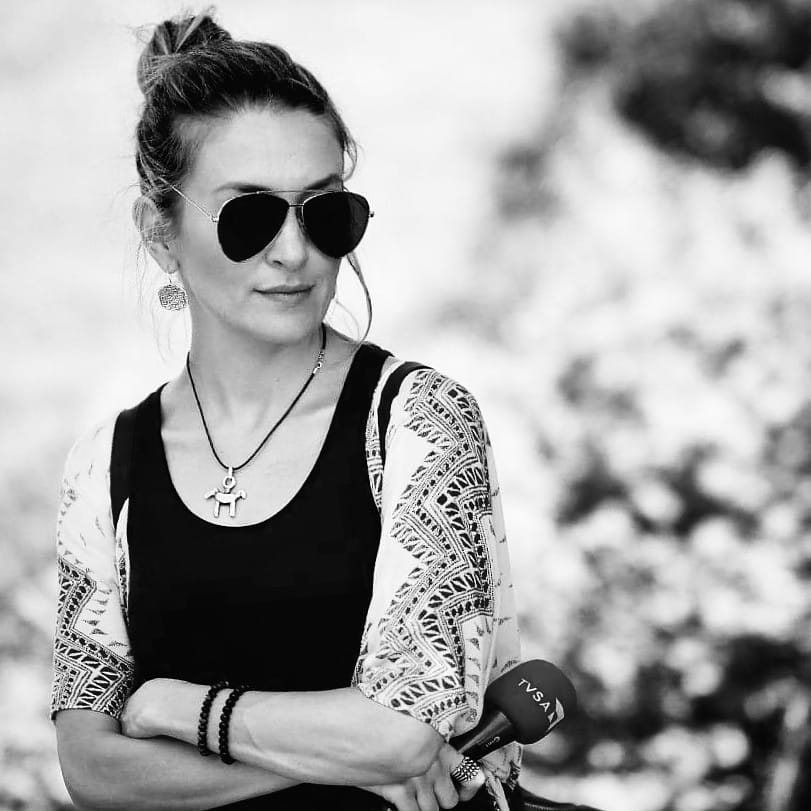By: Sanela Kapetanović
Sarajevo, 15.10.2019. – My first deep professional disappointment happened at the beginning of my career. I began with my work experience at the local television station (while still being an undergraduate journalism student) and during my first work experience year and later during the traineeship period; during one of many discussions held regarding the posting of public interest based information, my (more experienced) senior workmate, told me (while expressing her personal view) about the responsibility of reporting, by stating the following: “Tie your horse where the master tells you”. In the following years there were more of such mantras that were often used as ultimate argument or in simple journalists’ words – blackmailing or subliminal threat.
Simultaneously, nothing better than this sentence demystificated the position of local media houses in BiH society.
Bizarre misuses of public money
Scope of problems that journalists have been facing, including editors of local media houses, overcome the boundaries of few journalists’ cards, and therefore this particular text may serve merely as desperate cry to scientific and expert community for academic and expert intervention in this specific field of business. Individuals, journalists and editors that have been forced to protect their own personal integrity, even within closest environment of their editing offices, including desks and media houses, shall be subject of this specific text, bearing in mind that “maladjusted” professionals have been exposed in confronting professional occupation and localism – based propaganda.
The idea of public money media financing theoretically includes professionalism and independence from commercial advertisers, political establishment and other interest – based groups that may, on behalf of their own personal interests, neglect general public interest. Practically, this idea has been transformed into personal antagonism where public money is defined as election prey, that is, marked as personal property owned by the leading political groups and parties, and public interest, on the other hand is treated as political establishment interest that marks the dispersing and distribution of Entity, cantonal and municipal budget means on the other hand. When certain media house is forced to operate in accordance with interest – based priorities of governing politics, it becomes clear the public interest becomes a common venue which again becomes subject to various discussions and concerns, because it genuinely does not even exist as such; it is quite opposite.
The procedure of politically – based appointing to managerial positions represents aggravating circumstances., which structurally suffocate the principles of professional occupation in all spheres of media operating field. Personal interests suppress public interests and greatest danger is hidden in practice – playing of interest – based spheres and also in shaping of suitable environment, so the entire public media could eventually be transformed into a PR agency. That is how political structures appoint managers that in return, create “adequate” and “acceptable” program agenda in public media they run. This mutual relationship puts individuals that tend to remain professional and sustain their integrity into most difficult position, because during the process between the recommendation until releasing, journalists’ stories naturally go through the path of selection at program collegium, via editing and monitoring until journalists’ releasing and broadcasting.
What is taken as a premise in this constellation is undoubtedly professional and ethic responsibility of all precipitants in the process, with the scope of responsibility equal to hierarchical positions. Therefore, if the premises are wrong, then the conclusion must be wrong too, which according to practices and experiences by journalists was often confirmed. Local media journalists often encountered direct attempts by local politicians (of local governing official authority representatives) to interfere into media and program content and program, including the interference into journalists’ reporting, they also often try to impose their suggestions during local community venues and even try to problematize questions they are asked to reply. It is not uncommon that daily editor, editor – in – chief or certain manager receive information from the field before their journalist even return to the office. There were situations where politicians or local governing representatives would threaten journalists that they would call their bosses (editors or managers) and they often did call them. Such experiences, although present in local media houses, unfortunately, are rarely subject to public problems or official lawsuits. I shall refer to one case in the following chapter of this text.
TVSA female journalist was working this particular day and was a journalist on – duty. This shift should follow extraordinary and special affairs and venues and also events organized during the afternoon hours. On this particular day, there were two venues that were to be followed and covered, with less than 60 minutes of time lap between them. First event was signing the contract between the Labor Union (Syndicate) representatives and Prime Minster of Sarajevo Canton, and this was followed by another venue in the National Museum of Bosnia and Herzegovina. Tens of journalist had been waiting in the cantonal government premises for the beginning of the above mentioned contract signing procedure. Prime Minister and cantonal ministers were late and did not arrive to the government building at the time. According to the press office spokespersons, they said that they would be 30 minutes late. They had to attend the meeting in one of the municipal buildings outside Sarajevo. Journalists were nervous since they had been waiting for over 30 minutes.
“We shall begin in a minute”, Press officer tried to calm down the journalists, while he approached the TVSA female journalist. He asked her if he could have a word with her alone. Minister of Traffic and Communications had called and said that construction works were to commence the following day at the First Transversal Road and he was on his way with the Prime minister from the municipality. He had seen that the dredge was already on site so he phoned her demanding that she went there immediately, record the site and make a report. TVSA female journalists tried to hide the uncomfortable position that she was in by expressing humor and said that she was surprised with minister’s demand, because she did know that the minster was at the same the editor at the TVSA and that she did not see his name in the editing office, that is, on the time schedule. Government Press Officer was not even listening to what she had said and continued by stating that the minster said that other journalists were not important in this story, but he insisted that Cantonal TV journalist (reporter) must record the beginning of the above mentioned construction with camera, because the dredge had already been on the site marking the commencement of construction works that were to begin the next day. She expressed her gratitude and rejoined her colleagues in the hall.
90 minutes after that, she returned to the Desk without requested video report and without camera footage from cultural venue the she was supposed to cover (by the way cultural venues hardly get the chance to be broadcasted because the daily politics is always considered a top priority) and she reported her superior about the discomfort that she had experienced.
“I know about this, they phoned here and said that you were very rude to them”, said her editor.
Minister’s mandate was over one month before the beginning of construction work in the Transversal.
Irrationality and disrespecting the specificity of professional journalism and the truth as the sole imperative, including public interest and corrective nature, could perhaps best be seen from the relationship between local governing authorities and local media houses. This is particularly outlined in cases of various contracts regarding the covering of local community affairs where, for instance, municipalities disperse financial grants, and media houses should, in return, follow and cover the activities of local community managing structures. Although by nature, the primary activity of local media houses is reporting about local communities, their developing stages, problems, issues, challenges, projects etc. It is contracts which can make such relationships formal and in reality the most bizarre misuse of public money does occur as a result. Local televisions which, by their establishing acts are targeted towards local issues get finances (again) from public money deriving from lower governing levels, in order to make more thorough reports about local activities and affairs in every local community. It is the public that suffers the most in this market process due to the fact that, instead of having right to double – paid information that they should receive, they (public) are only left to witness the activity promotion displayed by local governing authorities that once again is paid with public money. Taking into consideration that this is about the promotion of public institutions, these kinds of contents are not even marked that they had already been paid for.
There are many cases where local media houses received calls and were requested to follow and cover daily affairs, such as for instance, municipal mayors addressing the pupils at the beginning of new school year, including the distribution of presents for kids; visiting construction sites at certain locations, ceremonial presentations of new public rubbish bins, all the way to most bizarre cases where journalists’ team was called to cover the event where municipal mayor was watching and visiting the cleaning and purifying of Miljacka River hutch. The cleaning was financed by City Council official authorities. Therefore, it is important to be more precise in writing about this issue. Namely, city council officials organized the cleaning and purifying of Miljacka River hutch, through four city based municipalities. One of these municipalities called the TV team to come and record (at specific time) how municipal mayor visits the site and witnesses the cleaning and purification process. This indeed happened. The worst thing was that this was not the worst thing that happened that day. Additionally, the TV female editor suggested to female journalist (site reporter) to record a stand up report and thus “enrich” this story, bearing in mind that the scene of the dredge cleaning the river hutch behind the camera was rather “televised” (not exciting). Luckily, this stand – up report never occurred, because the female journalist reporter refused to do such thing. In order to obtain a complete authenticity it is important to outline and highlight that this particular local media house had previously and in several occasions broadcasted relevant information (with all details included) in regard with the above outlined Miljacka river cleaning event.
Perhaps it would be possible to find a minimum of mutual understanding for municipal mayors or their press office spokespersons that may consider a morning walk of their boss as crucial and necessary for the headline being considered as general public interest. However, the journalist that fulfils and obeys such request does, in terms of contents, belong to municipal press office. The problem of this society is that the agitators in press offices of almost every single public service or public institutions get paid more than journalists and editors of public media houses.
Auto censorship or profession sacrifice
Once I decided to ask my female colleague (from other local media house) if she had ever had experience with auto censorship and imposed political pressures and I was petrified by her instant response. She told me that no one was imposing them with censorship, because they had been working long enough so they learnt what they should report about and what they should remain silent about. She seemed very proud when she said this, just like when an experienced editor explains to a beginner how, after having posted hundreds and thousands of posts and texts, the news on professional’s keyboard somehow gets assorted by itself. It is difficult to say whether censorship derives only as a consequence of local media oligarchy treatment or weather it provides space for censorship, but it is certainly more problematic than censorship itself. Auto censorship eliminates fundamental imperatives of professional journalism, natural journalists’ curiosity and possibility of building empathy with audience. Selective reporting transforms into a legitimate program policy and turns media into a single – path communication channel.
Auto censors use all available professional rhetoric, in order to justify non-reporting about certain issues, such as live reporting from protests or rallies, because there is a possibility that collocutors may mention the names of persons that are not present at the moment since their answers cannot be recorded alive on spot, so auto censure users accordingly define that as lack or absence of the other side of the story.
Auto censors are harmless and at the same time, marvelous agenda interpreters. Should a journalist or editor try to problematize, professionally or based on arguments and evidence, the relationship towards certain issues, auto censors shall find appropriate excuse for that. During the process of instrumentalization of a local media house, auto censors appeared as the most wanted resources – they would make professional advancing and their affection to conformity based sacrifice would additionally be interpreted as panegyric perspicuity of understating and comprehension of program commitment. This is actually a fundamental and core danger of auto censorship occurrence; it can easily be transmitted abroad on one hand, but it is very difficult to diagnose on the other hand In such professional ambience, junior journalists that decide to launch their careers, adopt and accept the forms of allowed boundaries and limits, thus reducing the possibility of professional emancipation of the entire media. Aggravating circumstance is perhaps the lack of adequate and appropriate monitoring mechanisms, including sanctions, because the processes of public manipulation and tendentious reporting evolve faster than legal regulations emerge. Additionally, media, from legal and formal point of view, do not violate the rules of Communication Regulatory Agency, but through ignoring particular topics and collocutors and by neglecting their own corrective, critical, educational and ethic social role, their own actions and activities are narrowed down to subliminal and impunity propaganda, which is still disparate with fundamental principles of professional journalism.
The responsibility for this particular position between the government that, through media, would have to be held accountable to public and media that would, in return serve the public as corrective tool of lowest and closest governing level (in this specific case), should certainly be sought in media alone. However, in this case, we shall deal with consequences and responsibilities regarding the origin and causes that are certainly out of media reach and deeply buried inside BiH social and political system. Looking from legislative perspective; the perspective that enables us and even does not discourage verbal and physical assaults and attacks on journalists and media representatives, through professional disengagement to notably envious economic and social position of all journalists. This, frankly speaking, is not a problem for journalists working for local media houses, but may display the existential (un)certainty and is surely the fundamental fear drive that would, under such circumstances, easily allow the conformism to presume into professionalism. In such system of values, neither long – term experience nor salary coefficient and professional title cannot result in guaranteed quality. Professional integrity is the only confirmation to certain people that (under almost impossible circumstances) defend the dignity of professional journalism, public interest and genuine truth. Rarities like these are dedicated and devotionally do their work, though laden with clear and present professional environment where their story may not even be posted or released. They are targeted as employees of local media houses that in corporation circles do not have notable reputation and are exposed to promotional ambitions of political and ruling establishment and this is exactly why they can make significant and important changes.
What happened to solidarity?
In all, or at least in most local media houses, there are professionals that have decided not to give up on professional imperatives laid before them. There are cases where employees – media representatives initiate court processes and law suits, filed in against media houses they work for, alone or with the assistance of various associations, unions (syndicates), staff councils and they do persist in their fight against media misuse, but also in order to keep and sustain their own integrity. Also, there are cases when group of employees launch labor disputes directed against oligarchy managements, which also implies a completely unenviable position where journalists are being targeted as conflictual and destructive factors within media houses, which often results in imposing of direct mobbing, disciplinary sanctions, fines, warnings and in most extreme situations results in dismissing and sacking. Lack of solidarity of professional journalists’ community and complete absence of reinforced and strengthened community (in form of union (syndicate) of media staff, excludes the possibility that this kind of cases could become more visible, and process outcomes they lead, could become more notable and important for entire media community, especially in the field of emancipations of social role and significance of local media houses as part of global democratization process.
Active solidarity of professional community is indeed a necessity in order to preserve fundamental professional values, integrity and autonomy of journalists. Additionally, I find important to emphasize that professional journalism in its core prefers ethics rather than exclusiveness. The case of malicious comment that local media male journalist, while making a report, received form his female colleague, when she said: „You will surely write your report as ordered”, illustrated a complete lack of ethics and professionalism. In doing so, I shall highlight that this case was about colleague who, in her entire journalism career had insisted on personal credibility and professional principles, since she did have situations where her reports were not allowed to be broadcasted or posted, despite the fact that she had refused any kind of censorship and political biasing in her stories and reports. Genuine empathy and common interest of professional reinforcement of the entire journalists’ community, which is required for BiH society, along with legislation, represents and displays a precondition for emancipation and democratization of our society. Otherwise, the fight for professional journalism, principles of public interest and the truth shall remain a legacy of every single journalist and editor, including individual fight, personal devotion and commitment.
Responsibility of fight for professional and independent public local media houses at the end is not just a responsibility of BiH media houses, because the managing figures in those houses are appointed so they could deliberately prevent this and obstruct the above outlined fight from happening. Local governing officials cannot be held responsible either, despite the fact that, on one hand it is their legal duty; however, it obviously does not represent their political interest on the other hand. The only left entity is the public that finances public media houses that in return, should serve the public in the first place and provide them with reports. Unfortunately, public cannot neither be considered nor treated as amphora’s mass, symbol or journalism stereotype.
Public includes every entity that pays taxes and enables the existence of public media houses, thus financing the work of institutions responsible for media monitoring, as well as politicians and governing officials. Political intervening cannot be considered normal, including their comments and suggestions in regard with the work of media houses, program schemes, contents or questions addressed to them and accordingly questions they are expected to answer. It is particularly inadmissible that a politician demands the dismissing of director or editor of any media house, without the response by adequate institutions that should determine any discrepancy in the work of such media house in the first place.
Political insulting and offending, theatrical emotions and provincial aggressiveness in BiH society have the capacity of forging most directed political and political party imposed pressures and turning them into public interest concern. Therefore, this text is some kind of an appeal to all my colleagues, professionals, journalists, editors, professional academic community members, urging them for solidarity, reinforcement and strengthening of professional journalism and its fundamental principles. Otherwise, we won’t even need ever popular stereotype “the time will show”, since it will be useless. Enslaving of public media has been paving the path to enslavement of the entire society and we, that decided to be professional journalists, should be aware of this in the first place or in words Ozren Kebo, our popular colleague, in his work “Advices to junior journalist”, we should be aware before even the time shows us that.
(The author is a journalist of Television Sarajevo; this article was published in E-journalist bulletin)


